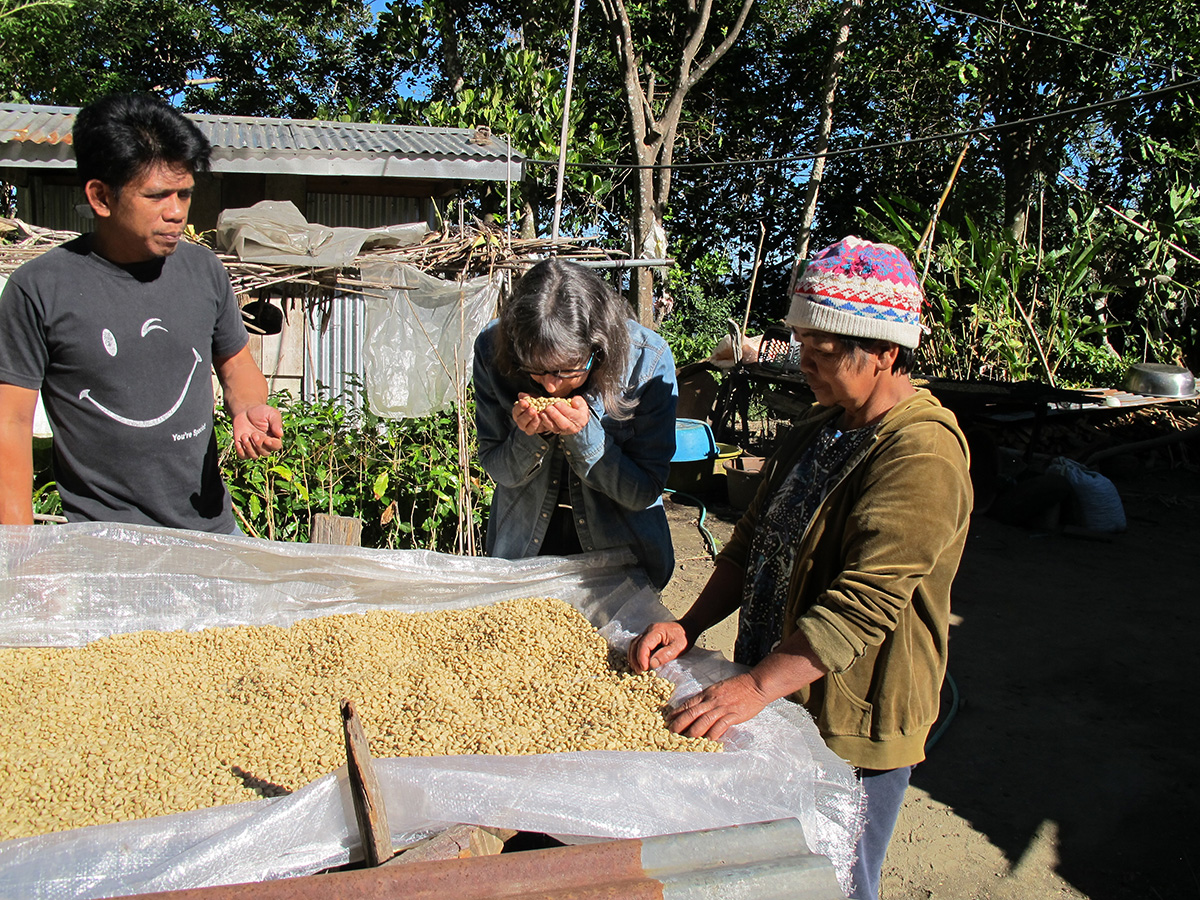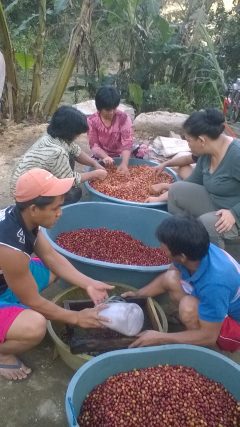Dr. Lynne Milgram is an economic anthropologist and Professor of Anthropology at OCAD University in Toronto, Ontario, Canada. This fall, Dr. Milgram presented her recent work, which investigates ‘social enterprise’ initiatives in the Northern Philippines Arabica coffee industry. I had the opportunity to interview Dr. Milgram and learn more about her work.

Arabica coffee beans drying to reduce the moisture content. Benguet province, Philippines. Photo: Milgram, 2019.
JW: I’m curious: what led you to this project, specifically the Philippines and the Arabica coffee industry?
LM: I started as a textile designer, a weaver, and then I got involved in textile history and helped found the Textile Museum of Canada here in Toronto, where I was a curator of Southeast Asian textiles for several years. My inquiries went beyond just the historical aspect of the cloth, and I wanted to know more about contemporary production. I then did my doctoral research on the commodification of women’s handicrafts in the Northern Philippines. My research question since that time has not changed its just moved across sectors. I’m an economic anthropologist, and I look at how small-scale producers, primarily women, make a living in a rapidly changing economy. I’m interested in how they use their skills and local knowledge to promote and sustain their production in an alternative economy if they are not involved in the formal economy working for regular businesses. These kinds of questions remain key, and for me, my research has led organically to the next topic. I’ve been able to return to the Philippines and have become involved in other sectors like second-hand clothing, wholesale vegetable farmers, and now specialty coffee. I look at how they use formal and informal business practices to realize their economic enterprise. What interests me is the way that people use social relations and mainstream connections to put together a livelihood. Within that, we can look at the altruistic way that people deal with each other, which is beyond the formal economy.
JW: Speaking of altruism, can you explain what enterprise sustainability and social entrepreneurship are?
LM: Firstly, the idea of an entrepreneur is someone that takes an innovative approach to business. Without the sustainable, social aspect, an entrepreneur is someone self-employed and who innovatively uses social, financial, and resource connections to make a particular enterprise work. I’m interested in looking at entrepreneurs but with a social, sustainable slant. In my experience, a social entrepreneur is someone who’s working beyond financial aspects. On the one hand, a social entrepreneur wants to enhance their own livelihood and the people with whom they are working, but they also have a sustainable social justice mandate. The social entrepreneurs I work with aim to increase people’s quality of life generally, so this may include helping them with health insurance or with community development. A social entrepreneur wants to build infrastructure within a community so that the community becomes more viable across different sectors. This may include gaining access to education, housing, and food security.
For an enterprise and entrepreneur to be sustainable, they often must forge cross-sector partnerships. This means that a social entrepreneur will engage in social justice initiatives, but at the same time, they may need to form strategic partnerships with for-profit organisations. This could include banks, insurance companies, or mainstream businesses to facilitate their social justice goals. The key to realize is that someone involved in social justice initiatives also needs to keep a foot in the mainstream financial enterprises because the entrepreneur has got to be financially sustainable to then be altruistic. So social entrepreneurship is an umbrella term for someone who can keep a foot in different fields to maintain their own sustainability and help with the sustainability of those they are working with.
JW: What are some of the challenges that speciality coffee initiatives face in the Northern Philippines that social entrepreneurship can help support?

Washing ripe Arabica coffee cherries before sorting and processing. Benguet province, Philippines. Photo: Milgram, 2019.
LM: The challenges for people to take control in the coffee industry are class-based and are a result of a lack of infrastructure and government support. The challenges in the industry to expand from their small start-ups also revolve around the physical situation of being in the Northern Philippines. For example, road transportation is limited, or in some areas, the internet connection and digital infrastructure are lacking. The government is not stepping up to provide the infrastructure that people need. Most of the coffee farmers who are successful in this specialty industry are working with social entrepreneurs to develop these small collective groups to overcome these challenges. For example, let’s say a cash crop farmer can make money from November to March, but for the other months of the year, they need to have another occupation. This could become precarious. The issue is that if they get sick, they have no health insurance; if their crop fails, their food security is threatened because there is no crop insurance. If anything like this happens, the time you can spend in your coffee production gets jeopardized. If there was more government support, more infrastructure, more of a social safety net, then people would be assured of better success.
Another challenge to the speciality coffee industry is that the infrastructure of the local society cannot support the industry. In other words, if there are not enough local buyers, then the money and profits are being exported more than they’re being reinvested in the local economy. What you find with specialty coffee is that it takes a lot of time to get a high-quality product, but you get a lower yield for the coffee. To get higher quality, the labour is intense, so the product costs a lot. So even the farmers that are producing it can’t afford it. They are keeping some damaged beans for home production, but it’s still extremely expensive. When I go to coffee shops in Manila, they’re not serving Philippine coffee they’re serving cheaper Latin American coffee. Instead, the coffee is being exported to the US for a huge price or to Japan to specialty coffee shops. What would help is if the government had a subsidy for specialty production that could support the labour involved in making a high-quality product.
JW: As an ongoing project, where will your research go from here?
LM: In addition to carrying on with this coffee project, I’m continuing work with the Toronto Filipino community. I’m looking at Filipino-Canadian grocery stores, convenience stores, and food processors. I’m looking at issues of food security, especially after the Covid-19 pandemic, and how these small neighborhood convenience stores continue to serve their community. I’m looking at these merchants, in a way, as social entrepreneurs because although they’re mainstream merchants with small convenience stores or small food processing plants, they’re still very much serving the community in many ways. So far, the data is suggesting to me that it’s the economic, social, and even the political that are all wrapped up in the services. I’m looking at the way they are engaging in transnational trade with the Philippines to get particular products produced for them in the Philippines and having it imported here so that they can appeal both to a new generation of Filipinos as well as older immigrants that came here in the 1970s. It’s been a very rewarding experience to visit all these small producers here in Toronto.
JW: It does sound very rewarding and very valuable to the community. Thank you so much, Dr. Milgram!
This interview has been edited for length and clarity.